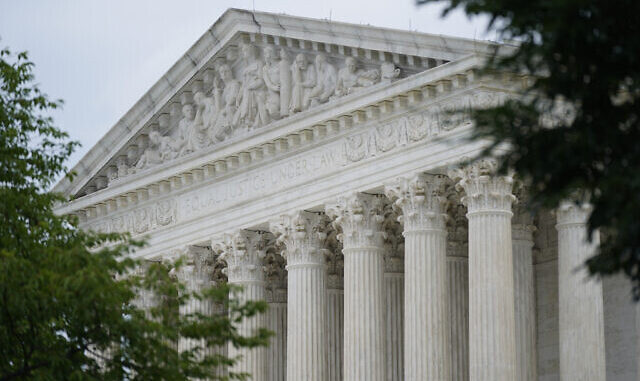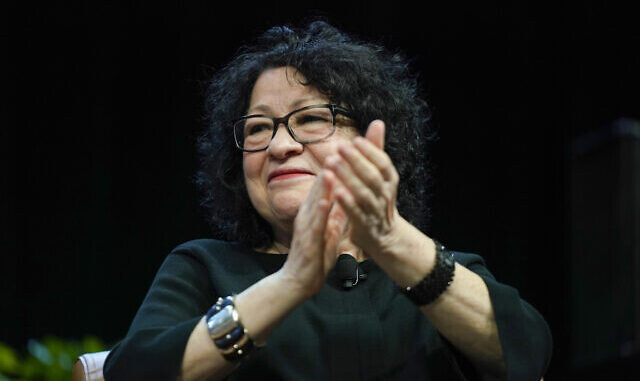Justice Sonia Sotomayor puts decision by lower court demanding recognition on hold ‘pending further order’; NY university cited 1st Amendment rights in emergency appeal

The US Supreme Court building in Washington, Monday, June 27, 2022. (AP/Patrick Semansky, File)
The US Supreme Court temporarily blocked a lower court’s ruling requiring Yeshiva University in New York City to recognize a campus LGBTQ pride group.
Justice Sonia Sotomayor granted an emergency request on Friday filed last week by the modern Orthodox university that cited its rights under the First Amendment, which protects the free exercise of religion. The university argued that such recognition would be contrary to its beliefs.
The decision puts on hold a ruling issued by a New York state judge in June that the school must recognize the group. It comes amid a lengthy legal battle between the university and an LGBTQ Pride Alliance Club hinging on whether the university is a religious or secular institution.
The university welcomed the decision Friday and said it can now “continue to live out its religious mission without government interference. The ruling “protects Yeshiva’s First Amendment rights and ability to conduct its internal affairs consistent with its religious values,” it said in a statement.
Yeshiva University President Ari Berman said the institution was “pleased with Justice Sotomayor’s ruling which protects our religious liberty and identity as a leading faith-based academic institution.
“But make no mistake, we will continue to strive to create an environment that welcomes all students, including those of our LGBTQ community. We remain committed to engaging in meaningful dialogue with our students, rabbis and faculty about how best to ensure an inclusive campus for all students in accordance with our Torah values,” Berman added.
In 2020, a group of LGBTQ student activists accused the university of discrimination in a complaint to the city’s Commission on Human Rights, then sued the university last year.
In June, NY Judge Lynn Kotler said that the university is chartered as a non-religious organization and is therefore subject to human rights law. The court also said the university offers too many secular degrees to qualify for religious exemptions.
The matter is on appeal in the state court system, but judges there refused to put the order on hold in the meantime.
Sotomayer said Friday that the Supreme Court’s decision came “pending further order.”

The court has a conservative majority that has previously ruled in favor of religious conservatives.
In June, conservatives who hold a 6-3 majority struck down a Maine program prohibiting state funds from being spent at religious schools and ruled a high school football coach in Washington state has the right to pray on the field after games.
In its emergency appeal to the highest court last Monday, Yeshiva university said it was seeking action “to conduct its internal affairs in accordance with its religious beliefs.”
“As a deeply religious Jewish university, Yeshiva cannot comply with that order because doing so would violate its sincere religious beliefs about how to form its undergraduate students in Torah values,” the request to the Supreme Court said.
“That ruling is an unprecedented intrusion into Yeshiva’s religious beliefs and the religious formation of its students in the Jewish faith. It is also an indisputably clear violation of Yeshiva’s First Amendment rights,” it said., and continues until September 12. Recognition would grant the Pride club funding and other benefits.
The university said in the statement that the lower court’s ruling “would force Yeshiva to put its stamp of approval on a club and activities that are inconsistent with the school’s Torah values and the religious environment it seeks to maintain.”
Same-sex orientation is largely forbidden in Orthodox Judaism.
The university argues it is a religious institution that requires all undergraduates to “engage in intense religious studies” and adheres to Jewish law on campus.
The Jewish Queer Youth activist group said in a statement that the university was “demonstrating the very homophobia that they claim does not exist on campus.”
“Instead of listening to what they are actually asking for, a safe space where they can form friendships and community, YU is deliberately confusing queer youth’s need for self-esteem with a non-existent demand for sexual behavior,” the group said.



Maybe SCOTUS can develop an interest in Christian Jan. 6 prisoners, now having been held for 600 days in horrific confinement, WITHOUT TRIAL.
https://www.thegatewaypundit.com/2022/09/introducing-political-prisoner-podcast-jake-lang-sponsored-gateway-pundit-week-jake-interviews-ashli-babbitts-mother-prison-block/
IF The L ………… GROUPS GET AWAY WITH IT AT YU, THEY WILL COME FOR ALL RELIGIOUS INSITUTIONS AND UNIVERIESTY’S.